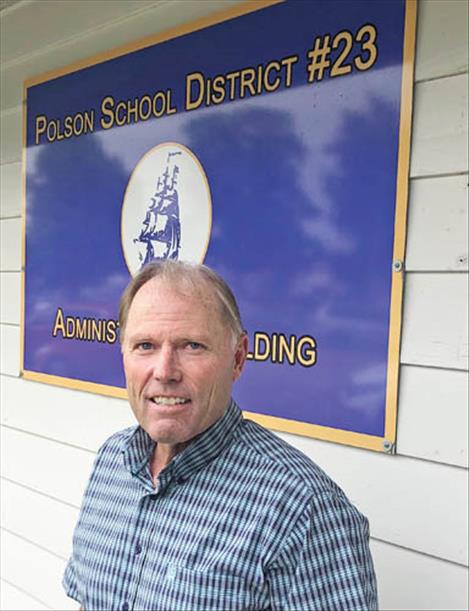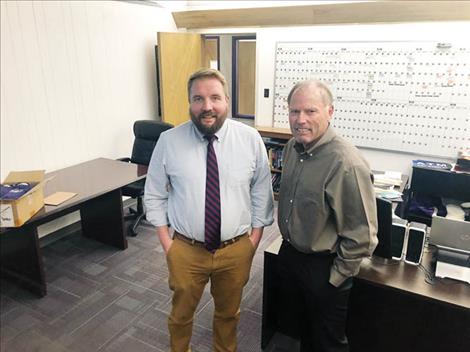Polson School District welcomes new superintendent
Hey savvy news reader! Thanks for choosing local.
You are now reading
3 of 3 free articles.
“How do you not fall in love with Polson, Montana?” asks Mike Cutler, the community’s new school superintendent. “To me, it’s one of those jobs, those school districts, those communities – no other can compete.”
Cutler was hired in February to replace interim superintendent Tom DiGiallonardo, who returns to his post as curriculum director. Cutler and his wife, Jody, bought a house in Polson in April, and Cutler took the helm July 1.
A storied college football player and high school coach, he also has a 21-year career as an administrator, serving 17 years as head of the Philipsburg School District, and the remainder as high school principal in Townsend (he also taught in Denton).
Cutler retired from his job in Philipsburg in 2019. “When you’re a small town school superintendent you become everything to everybody, meaning I was the superintendent, principal, athletic director, back-up bus driver and sometimes served lunches,” he said.
“I burnt out. I realized I no longer had the attitude that was needed to be an effective leader so I backed out.”
He did continue coaching the Flint Creek Titans, an athletic co-op he helped form between Philipsburg and Drummond, through 2020, when the Titans claimed their third state title for eight-man football.
During the interim, while his son, Kade, finished high school, he started a consulting business, and was hired by school districts to conduct Title IV investigations into allegations of sex discrimination, especially in athletic programs. He also mentored young superintendents in rural districts.
With Kade enrolled in his freshman year in engineering at Montana State University and his daughter, Sydney, working as a vet tech in Philipsburg, Cutler was ready to return to school administration.
“I knew I’d be back,” he said. “I also knew it would not be a small school where I was everything to everybody.”
Polson fits that bill. “There’re good people here to do things I was responsible for in a smaller district,” he says. “Obviously, the buck stops with me, but I’m one of those people – with my coaching background and all of that – it’s about a team and I’m here to support the team that’s already here.”
Although Cutler is adamant that his coaching days are behind him, he sees corollaries between running a school district and a football team.
“Any system, school or team is as successful as the leadership at the top,” he says. “I’m the last one to tell you I’m an expert at every part of education. But knowing I don’t know everything makes me a good listener and follower when need be.”
Cutler steps into his role in the midst of an ongoing pandemic and contentious debate about how best to keep kids and staff safe.
“In my mind COVID is never going away,” he said. “With new strains coming up, this is just something that’s going to continue and we have to get some kind of control over it.”
His recommendation to the school board is to return to in-person learning and discontinue remote learning, with options available for students who are quarantined. Teachers worked “triple time” last year, between classroom teaching and trying to educate “remote learners,” kids who weren’t attending school due to the pandemic.
“I think our teachers were asked and went above and beyond their job description last year,” he says. “I’m not in favor of doing that again.”
Instead, he’s advocating flexibility that allows teachers to help kids who are quarantined via Google Classroom or “the old-fashioned way,” by sending packets home “so their education doesn’t stop and start again when they come back.”
As of Friday, the district planned to reopen Tuesday with Stage 3 protocols. Basically, it’s almost normal, with a few exceptions: schools will continue to rigorously sanitize spaces and equipment, students and staff are encouraged to maintain social distancing and wash hands frequently, and those who are not feeling well are urged to stay home.
All students are required to wear masks on school buses (a federal mandate), although masking in school is optional. Vaccinations are encouraged for those who qualify. COVID numbers in Lake County will be tracked on a daily basis, and protocols could change abruptly.
“If we start to have outbreaks we’ll have to reevaluate our masking policy,” Cutler says. “Both sides are very intense about that. I just hope if and when decisions are made people can respect those decisions.”
School boards across the nation have been at the vortex of controversies over how to reduce exposure to the virus. “I don’t know that school boards in modern history have had this difficult of a decision when it comes to the safety of kids and staff,” says Cutler.
Other priorities this year include addressing ongoing ventilation issues at Cherry Valley and Linderman schools. Some federal Elementary and Secondary School Emergency Relief (ESSER) funds were deployed this summer to address the middle school heating, ventilation, and air conditioning system (HVAC). Cutler is hopeful additional funds might be available for the other two schools.
“Learning starts with the best educational environment students can be in, and being in a classroom that has zero ventilation in early September when it’s 85 or 90 degrees out is not conducive to learning,” says Cutler. “Currently, it’s not conducive to health either.”
He said the building committee has also discussed putting a “no fluff” mill levy or bond election before voters to address HVAC and school safety issues. He’s familiar with the process, having been part of three successful bond elections in Townsend and Phillipsburg.
“It would be my job to make sure we’re listening to the community,” he said. “I’m not in favor of a shoot-for-the-moon approach. I’m a realist.”
Some district schools, he adds, “are busting at the seams.” As of last week, more than 20 new students had enrolled in the district, and high school enrollment is expected to reach 600 students in the next two years.
Cutler is also a big fan of professional learning communities, a process that encourages teachers to continually collaborate on best practices and curriculum standards in their grade level or teaching area. It was a process that Polson began a few years ago “but COVID threw everything into a tailspin.”
On a personal note, Cutler looks forward to watching his son play football for the MSU Bobcats and watching the Pirates play from the Polson bleachers. “I haven’t been able watch a game as a fan for 25 years,” he says. “And what better place to watch a high school football game than Polson?”

















